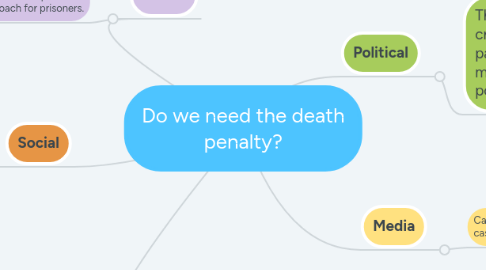
1. Global
1.1. All European countries have abolished capital punishment and have adopted a more rehabilitative approach for prisoners.
1.1.1. The U.S. spends an average of $195 per inmate per day, England spends $128, All of Europe spends $106. Nordic countries generally spend more, with Sweden at $349 and Norway at $311.
1.1.1.1. Why do Americans pay so much per inmate and yet the quality is so much lower?
1.1.1.2. Death penalty procedure primarily uses the chemical injection method, which is made in Europe, but since Europe had abolished the death penalty, the price for the chemical has grown exponentially due to a shortage of both suppliers and the product.
2. Economic
2.1. Defendants spend an average of 3557 hours per trial, and an attorney charge an average of $100 per hour. Prosecution offices recently started allocating more staff to one case because of the amount of time spent on it.
2.1.1. With recent technology advancements, there are more extensive mental health history, sometimes requiring CT or MRI scans. Prosecutors and defense attorneys have raised their prices to match the increased quality and costs of experts on mental health.
2.1.1.1. In Texas, it cost between $500k and $700k to obtain a death penalty, and $300k just to keep the sentence from being overturned. It is more now because of inflation. There was someone who was sentenced to death in 1978, but wasn't actually executed until 2010, which means the taxpayer was paying for his meals for 32 years.
2.1.1.1.1. Can we find a more efficient way to convict someone and sentence them to death without spending this much?
2.1.1.1.2. Why go through this process when it is more cost effective to keep them in prison for life?
3. Social
3.1. Most people who were convicted in a federal court are not executed either because their punishment is reduced or they are later found innocent. Meanwhile on a state level 24 states have abolished the death penalty.
3.1.1. Do juries have trouble taking someone else's life or is the death penalty just unnecessary?
3.1.1.1. Should we change our system where solitary is the worst punishment?
3.1.1.1.1. With the tides turning in favor of abolishing the death penalty, it is harder to find a jury that is ambivalent of execution, which takes more time in the court.
4. Political
4.1. There have been many "war on crime" campaigns throughout the past 50 years, which has led to mass arrests, and an increase in the populations of jails in the U.S.
4.1.1. Bill Clinton passed the "anti-terrorism and effective death penalty act of 1996", which attempted to shorten the trials of people who might possibly be sentenced to death.
4.1.1.1. While it was in an effort to decrease the costs of these trials, it often forced the jury to come to a decision too fast, and ended up costing more money, since they would have to re-review the case and keep them on death row for years before they came to a decision, which more times than not was less than the death penalty
4.1.1.1.1. There are a lot more executions on a state level than a federal level. Why are there so many more deaths at a state level?
5. Media
5.1. Can the media influence the outcome of a case?
5.1.1. Rodney Reed is on death row right now even though he is innocent, but because of a petition made by the public, his execution has at least for now, been delayed.
5.1.1.1. In the OJ Simpson case, his lawyer convinced the media that it was a race issue, and although the jury is supposed to stay away from the news, it was nearly impossible, since the case was everywhere. Didn't even have the internet yet.
5.1.1.1.1. Is the media ever reliable if it can be so easily be swayed?
